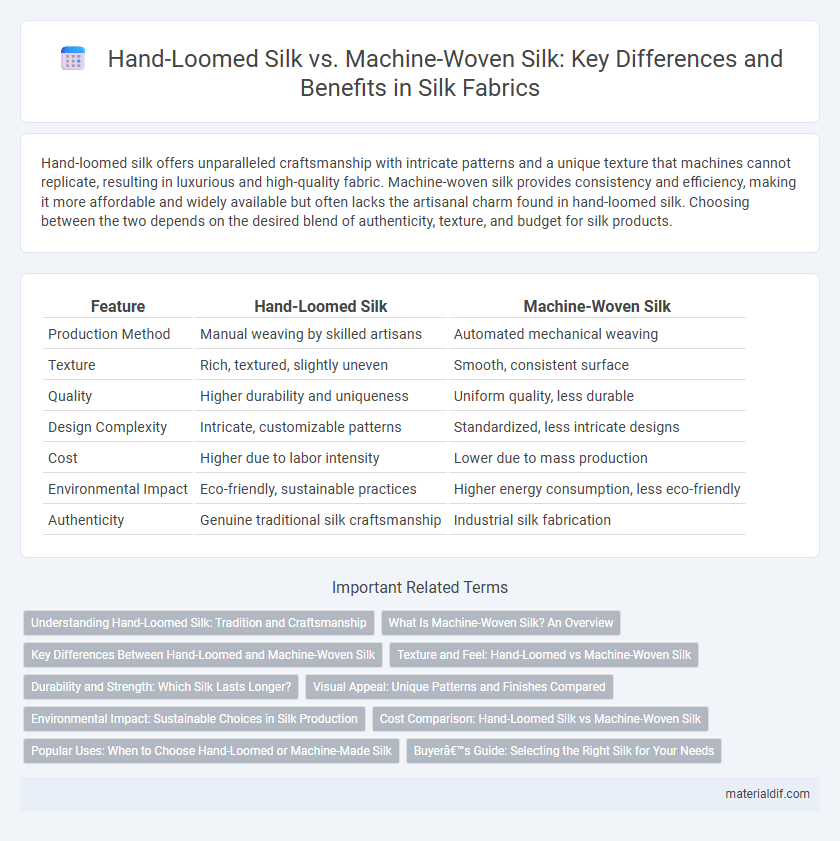Hand-loomed silk offers unparalleled craftsmanship with intricate patterns and a unique texture that machines cannot replicate, resulting in luxurious and high-quality fabric. Machine-woven silk provides consistency and efficiency, making it more affordable and widely available but often lacks the artisanal charm found in hand-loomed silk. Choosing between the two depends on the desired blend of authenticity, texture, and budget for silk products.
Table of Comparison
| Feature | Hand-Loomed Silk | Machine-Woven Silk |
|---|---|---|
| Production Method | Manual weaving by skilled artisans | Automated mechanical weaving |
| Texture | Rich, textured, slightly uneven | Smooth, consistent surface |
| Quality | Higher durability and uniqueness | Uniform quality, less durable |
| Design Complexity | Intricate, customizable patterns | Standardized, less intricate designs |
| Cost | Higher due to labor intensity | Lower due to mass production |
| Environmental Impact | Eco-friendly, sustainable practices | Higher energy consumption, less eco-friendly |
| Authenticity | Genuine traditional silk craftsmanship | Industrial silk fabrication |
Understanding Hand-Loomed Silk: Tradition and Craftsmanship
Hand-loomed silk showcases intricate craftsmanship, preserving traditional weaving techniques that create unique textures and patterns often absent in machine-woven silk. Artisans manually operate looms, producing fabric with subtle variations and superior softness that reflect cultural heritage and skilled artistry. This method supports sustainable practices and local economies while offering a distinct tactile and aesthetic experience compared to mass-produced silk.
What Is Machine-Woven Silk? An Overview
Machine-woven silk is produced using automated looms that efficiently interlace silk threads at high speeds, enabling mass production with consistent texture and pattern. This method offers uniformity and durability, often used in commercial textile manufacturing for clothing and home decor. While it lacks the artisanal touch of hand-loomed silk, machine-woven silk remains a popular choice for affordable, high-quality silk fabrics.
Key Differences Between Hand-Loomed and Machine-Woven Silk
Hand-loomed silk showcases intricate craftsmanship with each thread woven by skilled artisans, resulting in unique texture variations and subtle irregularities that enhance its aesthetic value. Machine-woven silk offers uniformity and faster production, providing consistent patterns and smoother finishes suitable for mass-market textiles. Key differences include the hand-loomed silk's superior breathability and strength due to natural tension control, whereas machine-woven silk emphasizes efficiency and cost-effectiveness in large-scale manufacturing.
Texture and Feel: Hand-Loomed vs Machine-Woven Silk
Hand-loomed silk offers a unique texture characterized by subtle irregularities and a softer, more luxurious feel due to the careful manual weaving process. Machine-woven silk typically presents a smoother, more uniform surface but lacks the organic depth and tactile richness found in hand-loomed fabrics. The hand-loom technique enhances the natural sheen and strength of silk fibers, resulting in a fabric with increased durability and aesthetic appeal.
Durability and Strength: Which Silk Lasts Longer?
Hand-loomed silk typically exhibits greater durability and strength due to the meticulous craftsmanship and tighter weave patterns, which enhance fabric resilience over time. Machine-woven silk, while more uniform and produced at a faster rate, may have weaker thread interlocks, making it more susceptible to wear and tear. Studies indicate hand-loomed silk garments can last significantly longer with proper care, retaining both tensile strength and luster beyond machine-woven counterparts.
Visual Appeal: Unique Patterns and Finishes Compared
Hand-loomed silk exhibits exquisite irregularities and intricate patterns that showcase artisanal craftsmanship, offering a rich texture and depth unattainable by machine weaving. Machine-woven silk delivers consistent, uniform finishes with precise and repetitive patterns, ideal for mass production and standardized aesthetics. The unique visual appeal of hand-loomed silk highlights cultural heritage and individuality, while machine-woven silk emphasizes efficiency and scalability in textile manufacturing.
Environmental Impact: Sustainable Choices in Silk Production
Hand-loomed silk production significantly reduces carbon emissions and energy consumption compared to machine-woven silk, promoting environmental sustainability. The artisanal weaving process minimizes waste and utilizes eco-friendly dyes, preserving natural resources and supporting biodiversity. Choosing hand-loomed silk champions sustainable craftsmanship and reduces the ecological footprint of textile manufacturing.
Cost Comparison: Hand-Loomed Silk vs Machine-Woven Silk
Hand-loomed silk typically commands a higher price due to the labor-intensive process and artisanal craftsmanship involved, resulting in unique texture and quality. Machine-woven silk, produced on automated looms, offers a more affordable option with faster production rates but may lack the intricate detailing found in hand-loomed fabrics. The cost disparity reflects not only production efficiency but also the value placed on traditional weaving techniques and exclusivity in hand-loomed silk.
Popular Uses: When to Choose Hand-Loomed or Machine-Made Silk
Hand-loomed silk offers unique texture and craftsmanship, making it ideal for luxury fashion, traditional garments, and high-end home decor where exclusivity and artisanal quality are prioritized. Machine-woven silk provides consistent texture and affordability, suitable for mass-produced clothing, bedding, and upholstery requiring durability and uniformity. Choosing hand-loomed silk emphasizes heritage and individuality, while machine-made silk favors accessibility and scalability in fabric production.
Buyer’s Guide: Selecting the Right Silk for Your Needs
Hand-loomed silk offers unique textures and intricate patterns due to artisanal craftsmanship, making it ideal for buyers seeking exclusivity and premium quality. Machine-woven silk provides consistent fabric strength and uniformity, suitable for those prioritizing durability and budget-friendly options. Consider the intended use, desired texture, and budget to select the right silk type that balances aesthetic appeal with practical requirements.
Hand-loomed silk vs machine-woven silk Infographic

 materialdif.com
materialdif.com